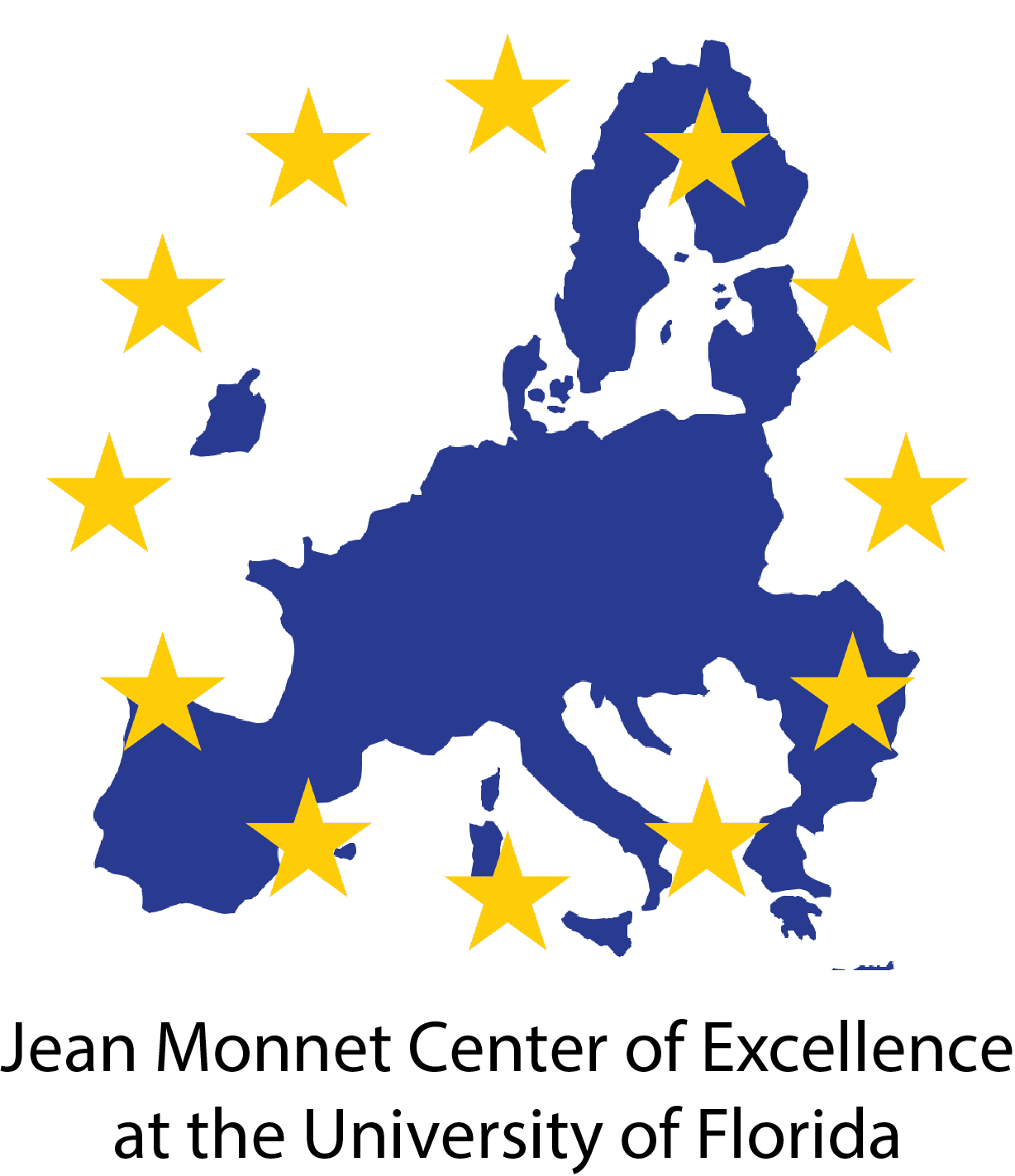European Security: Beyond Guns and Soldiers
1-3 Credits (variable), Spring 2019
Instructors
Instructor
Prof. David J. Galbreath – University of Bath
Instructor of record
Prof. Zachary Selden – UF, Dept. of Political Science
Course Description
This course is designed to make students familiar with a range of security
issues confronting Europe and the transatlantic alliance. In addition to
more traditional concerns, the course will focus on an expanded definition
of security as it applies to Europe and the wider region. This will include
an examination of energy security, the role of information systems in
security, as well as migration, health and food security. Students may take
this course for variable credit. For 1 credit, students are expected to do
the required reading and take a test at the end of the course. For 2
credits, students take the same test and write a short 5 page literature
review. For 3 credits, students will take the test and write a 15-20 page
research paper. All students are expected to do all of the required reading
in advance and participate in class discussions. This is a small seminar,
not a lecture course. As such, it will be driven by class discussion of the
reading. The course will meet ten times. The first nine will be class
discussion sessions as listed below. The last session will be the workshop
on Friday April 12 which will bring together academics and policy
professionals from Europe and the United States. Students should be at all
ten meetings to receive credit for participation. If you know that you will
not be able to attend one session, please let the instructor know in
advance.
Course Schedule
Day 1 – Monday, April 1 – Introduction: Traditional Concepts of Security
Topics: Realism, Liberalism, constructivism, gender theory
Readings:
-
Chapter 3 in Galbreath, David J., Jocelyn Mawdsley, and Laura Chappell,
Forthcoming 2019. Contemporary European Security, Routledge:
London. - Chapters 2, 3, in Biscop, Sven, and Richard G. Whitman, eds. 2013. The Routledge Handbook of European Security. London; New York: Routledge.
-
Jenichen, Anne, Jutta Joachim, and Andrea Schneiker. 2018. “‘Gendering’
European Security: Policy Changes, Reform Coalitions and Opposition in
the OSCE.” European Security 27(1): 1–19.
Day 2 – Tuesday, April 2 – European Security in the Post-WWII Era
Topics: Origins of NATO, nuclear deterrence
Readings:
-
James Blackwell, “In the Laps of the Gods: The Origins of NATO Forward
Defense,” Parameters(1985). -
Lawrence Kaplan, “The United States and the Origins of NATO
1946-1949,” The Review of Politics, 31:2 (April 1969) 210-222. -
Yost, David S. 2011. “The US Debate on NATO Nuclear Deterrence.” International Affairs
87(6): 1401–38. -
McNamara, Robert S. 1983. “The Military Role of Nuclear Weapons:
Perceptions and Misperceptions: Foreign Affairs, Fall 1983.” Survival
25(6): 261–71.
Day 3 – Wednesday, April 3 – European Security after the Fall of the
Berlin Wall
Topics: Evolution of NATO, the EU as an emerging security actor,
relations with Russia
Readings:
-
Kroenig, Matthew. 2015. “Facing Reality: Getting NATO Ready for a New
Cold War.” Survival 57(1): 49–70. -
Stefanova, Boyka. 2005. “The European Union as a Security Actor:
Security Provision through Enlargement.” World Affairs 168(2):
51–66. -
Sperling, James, and Mark Webber. 2009. “NATO: From Kosovo to
Kabul.” International Affairs 85: 491–511. -
Kropatcheva, Elena. 2012. “Russia and the Role of the OSCE in European
Security: A ‘Forum’ for Dialog or a ‘Battlefield’ of Interests?” European Security
21(3): 370–94.
Day 4 – Thursday, April 4 – New Concepts of Security
Topics: Human security, broader definitions of security
Readings:
-
David Campbell, Writing Security(Minneapolis: University of
Minnesota Press, 1992). 1-15 -
Smith, Steve. 1999. “The Increasing Insecurity of Security Studies:
Conceptualizing Security in the Last Twenty Years.” Contemporary Security Policy
20(3): 72–101. -
Guerrina, Roberta, Laura Chappell, and Katharine A.M. Wright. 2018.
“Transforming CSDP? Feminist Triangles and Gender Regimes: CSDP and
Gender Regimes.” JCMS: Journal of Common Market Studies 56(5):
1036–52. -
Martin, Mary, and Mary Kaldor, eds. 2009. Eu and Human Security : European External Interventions and
Missions. [S.l.]: Routledge.
Day 5 – Friday, April 5 – European Defense and the Revolution in Military
Affairs
Topics: What is an RMA, the RMA in historical context, RMA in European
context
Readings:
-
Andrew Krepinevitch, “From Calvary to Computer: The Pattern of Military
Revolutions,” The National Interest, Fall 1994. - Cohen, Eliot, ‘Change and Transformation in Military Affairs’, Journal of Strategic Studies, 27:3 (2004), pp. 395-407.
-
Galbreath, David J. 2015. “RMA, European Militaries, and the Limits of
Modernization.” In Reassessing the Revolution in Military Affairs: Transformation,
Evolution, and Lessons Learned, Basingstoke: Palgrave Macmillan, 156–74. -
Galbreath, David J., and Simon J. Smith. 2016. “Military Capabilities
and Force Transformation.” In The EU, Strategy and Security Policy: Regional and Strategic
Challenges, London: Routledge, 186–201.
Day 6 – Monday, April 8 – European Issues in Energy Security
Topics: Energy as a security, EU-Russian relations
Readings:
-
Goldthau, Andreas, and Nick Sitter. 2015. “Soft Power with a Hard Edge:
EU Policy Tools and Energy Security.” Review of International Political Economy
22(5): 941–65. -
Neuman, Marek. 2010. “EU–Russian Energy Relations after the 2004/2007 EU
– Enlargement: An EU – Perspective.” Journal of Contemporary European Studies
18(3): 341. -
Kirchner, Emil, and Berk, Can. 2010. “European Energy Security
Co-Operation: Between Amity and Enmity.” Journal of Common Market Studies
48: 859–80. -
Proedrou, Filippos. 2007. “The EU-Russia Energy Approach under the Prism
of Interdependence.” European Security 16: 329–55.
Day 7 – Tuesday, April 9 – Europe and Cyber-Security
Topics: Cyber security and governance
Readings:
-
Cavaiola, Lawrence J., David C. Gompert, and Martin Libicki. 2015.
“Cyber House Rules: On War, Retaliation and
Escalation.” Survival57(1): 81–104. -
Junio, Timothy J. 2013. “How Probable Is Cyber War? Bringing IR Theory
Back In to the Cyber Conflict Debate.” Journal of Strategic Studies
36(1): 125–33. -
Galinec, Darko, Darko Možnik, and Boris Guberina. 2017. “Cybersecurity
and Cyber Defence: National Level Strategic Approach.” Automatika
58(3): 273–86. -
Renard, Thomas. 2018. “EU Cyber Partnerships: Assessing the EU Strategic
Partnerships with Third Countries in the Cyber Domain.” European Politics and Society
19(3): 321–37 -
Mumford et. al. “The Need for International Perspectives to Solve Global
Biosecurity -
Challenges” Chapter 18 in Practical Tools for Plant and Food
Biosecurity, 2017.
Day 8 – Wednesday, April 10 – The Health of the EU: Migration, Disease and
Agricultural Security
Topics: Migration, Food Security
Readings:
-
Huysmans, Jeff. 2000. “The European Union and the Securitization of
Migration.” Journal of Common Market Studies 38: 751–77. -
Galbreath, David, and Joanne McEvoy. 2012. “European Organizations and
Minority Rights in Europe: On Transforming the Securitization
Dynamic.” Security Dialogue 43(3): 267–84. -
Schumacher, Tobias. 2015. “Uncertainty at the EU’s Borders: Narratives
of EU External Relations in the Revised European Neighbourhood Policy
towards the Southern Borderlands.” European Security 24(3):
381–401. -
Perkowski, Nina. 2018. “Frontex and the Convergence of Humanitarianism,
Human Rights and Security.” Security Dialogue: 096701061879667. -
Bureau, Jean-Christophe and Johan Swinnen. 2018. “EU Policies and global
food security.” Global Food Security 16: 106-115. -
European Commission, 2017. A European One Health Action Plan against Antimicrobial
Resistance.
Day 9 – Thursday, April 11 – Balancing Security and Democracy in the
European Context
Topics: Security, democracy, rights
Readings:
-
Huysmans, Jef. 2016. “Democratic Curiosity in Times of
Surveillance.” European Journal of International Security1(1):
73–93. -
Aradau, Claudia. 2004. “Security and the Democratic Scene:
Desecuritization and Emancipation.” Journal of International Relations and Development
7: 388–413. -
Aradau, Claudia, and Tobias Blanke. 2018. “Governing Others: Anomaly and
the Algorithmic Subject of Security.” European Journal of International Security
3(1): 1–21. -
Fabbrini, Federico. 2018. “Courts and the Politics of Secrecy: National
Security, Human Rights and the Importance of Supranational
Oversight.” West European Politics 41(4): 869–89.
Friday, April 12 – Workshop in Dauer 215 from 8:15 am – 5:00pm


